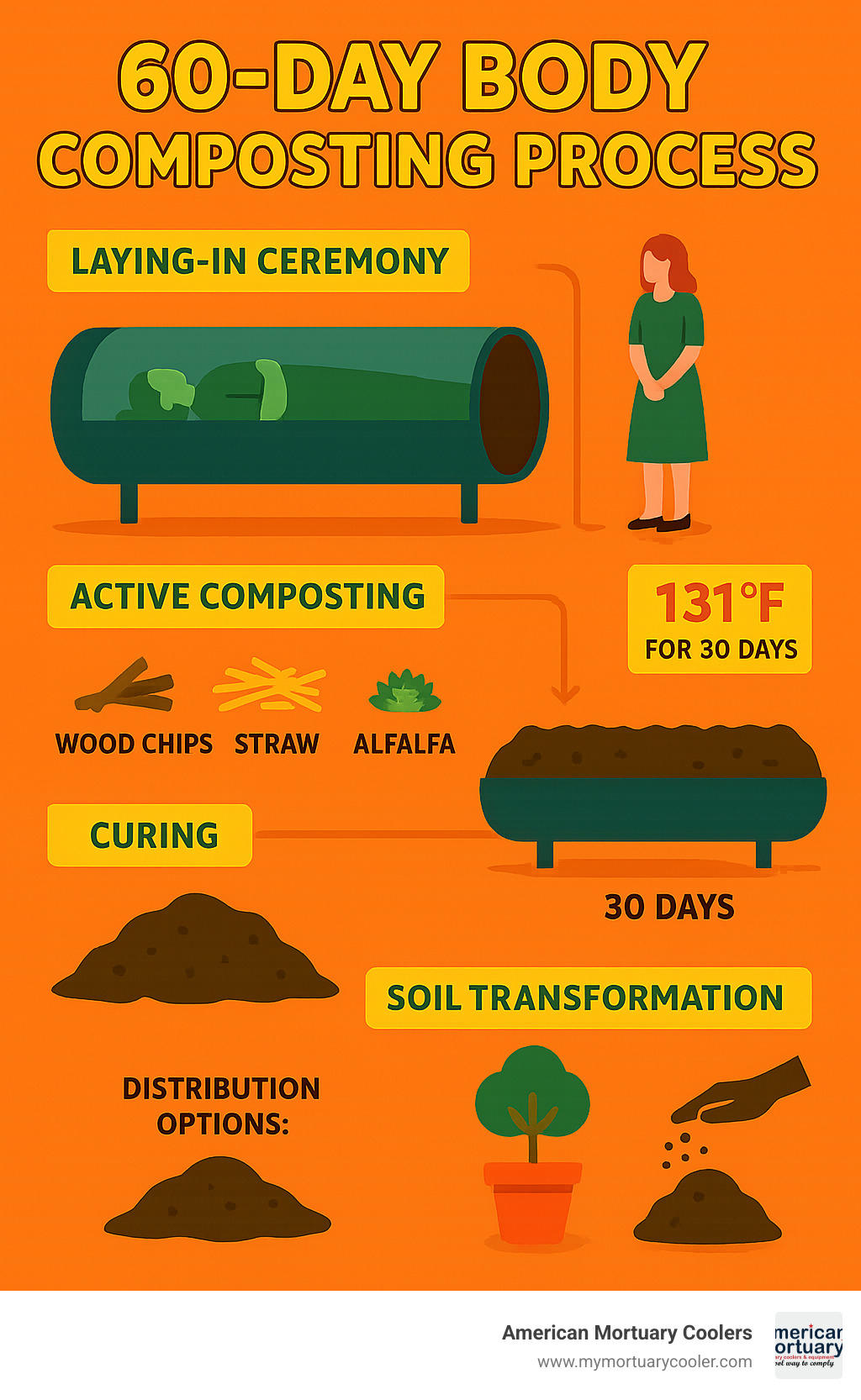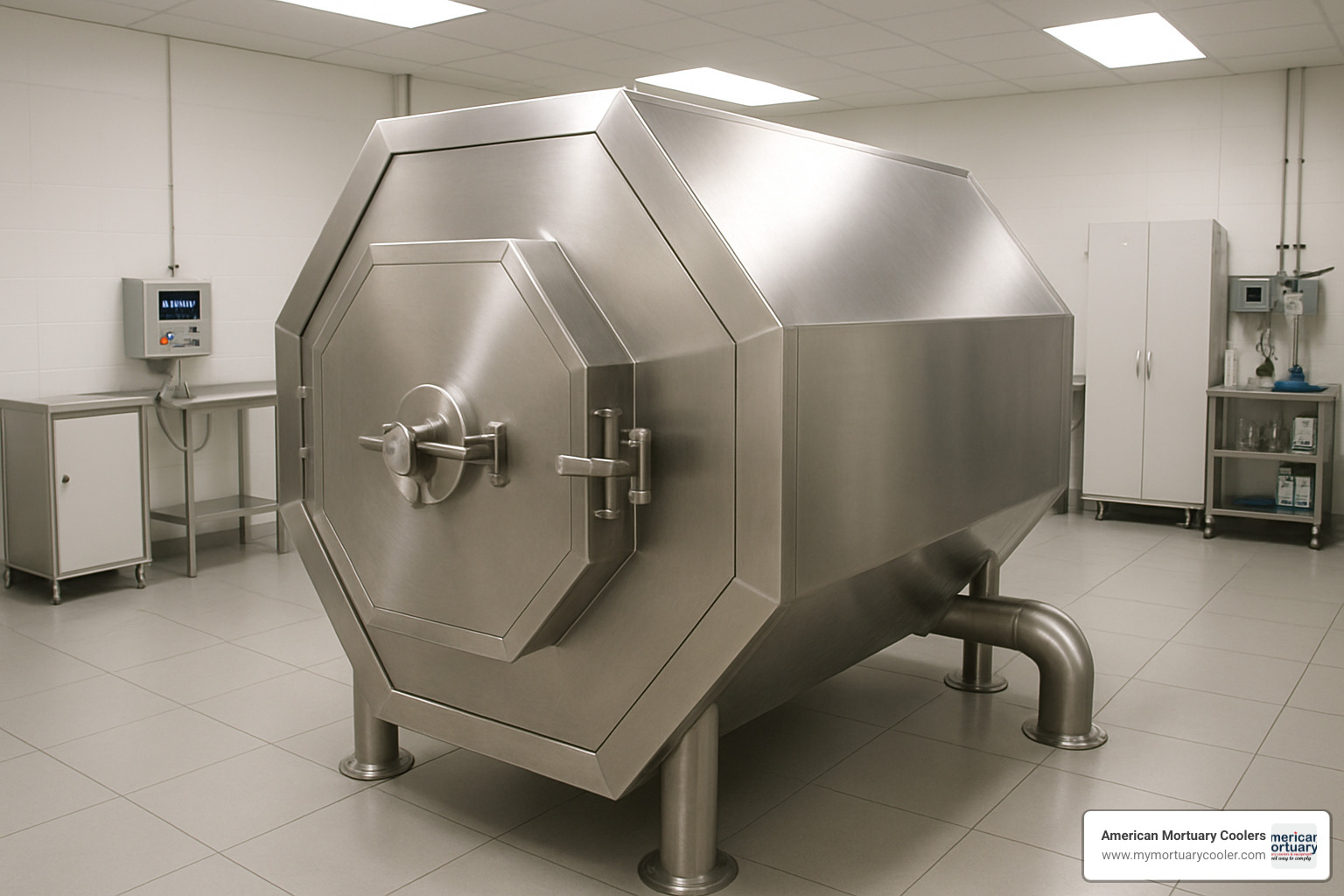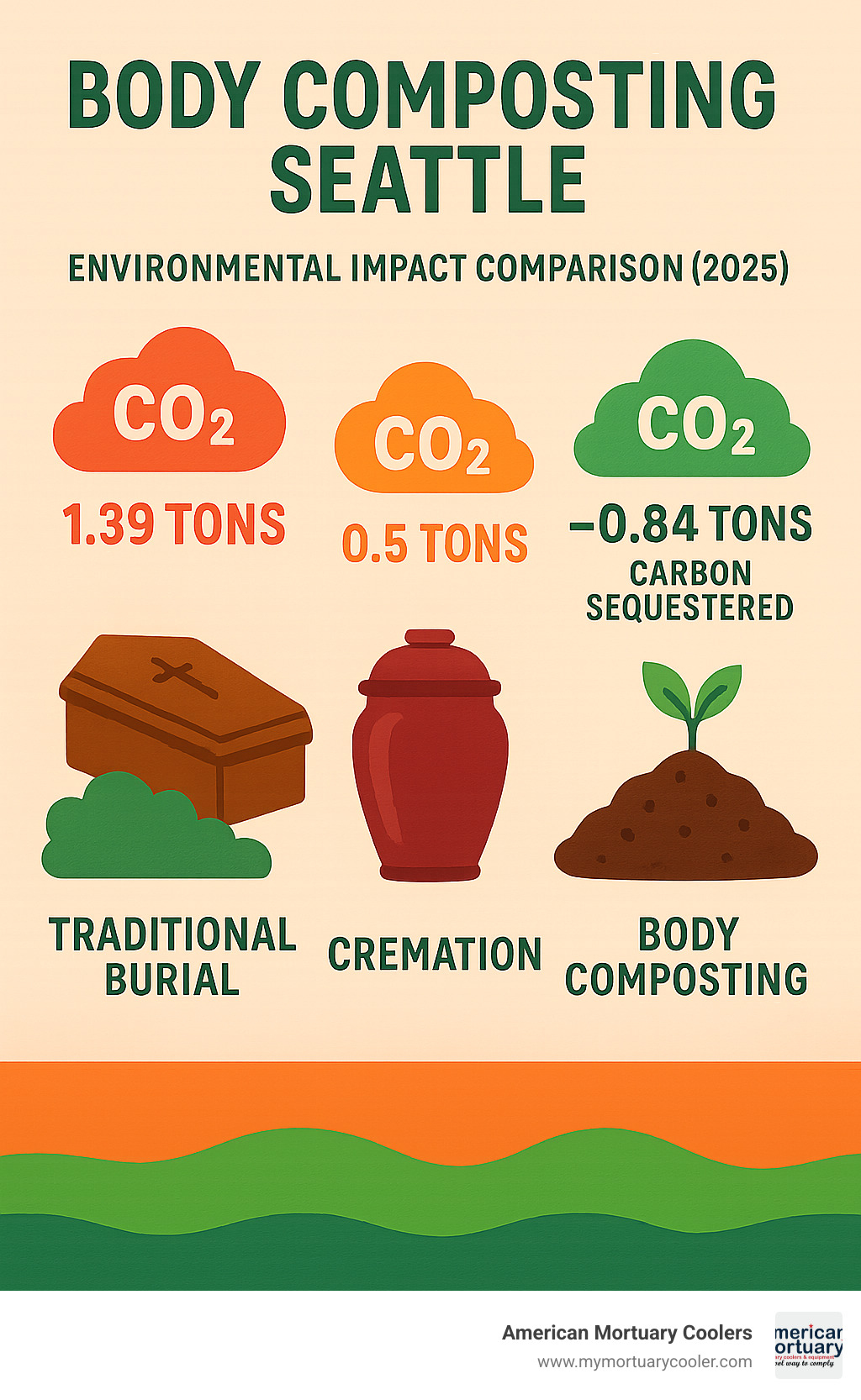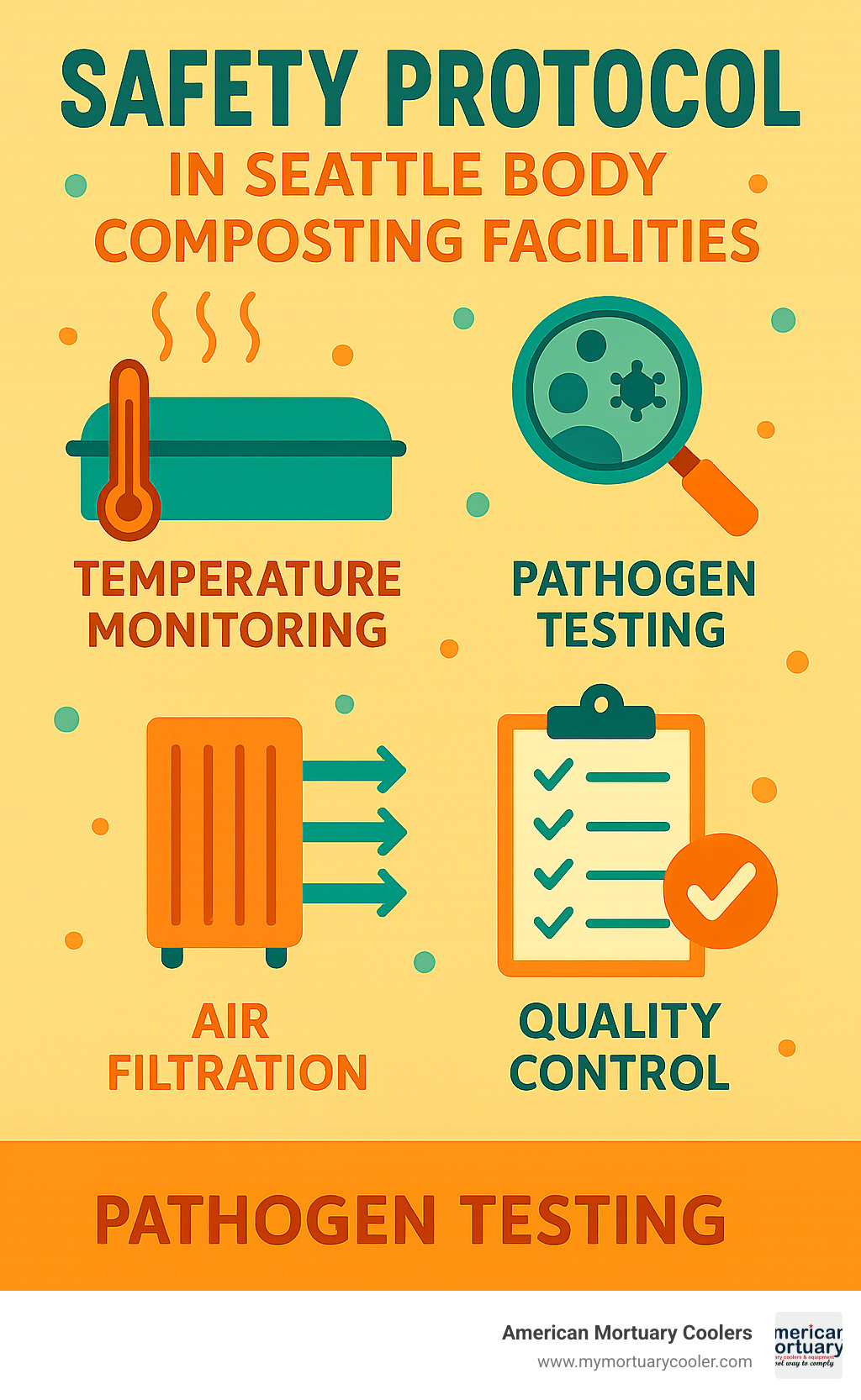Why Body Composting Seattle is Leading America's Green Death-Care Revolution
Body composting seattle has become the most searched eco-friendly funeral option in Washington State since legalization in 2019. Here's what Seattle residents need to know:
Quick Facts:
- 4 major providers in Seattle area: Recompose, Return Home, Earth Funeral, Bonney Watson
- Cost range: $3,795 - $7,000 (comparable to traditional burial/cremation)
- Process time: 60 days total (30 days active composting + 30 days curing)
- Environmental benefit: Saves over 1 metric ton of CO₂ per person
- End result: 1 cubic yard of nutrient-rich soil for families
Washington became the first state to legalize human composting in 2019. The process transforms bodies into soil using natural microbes, wood chips, alfalfa, and straw in temperature-controlled vessels. Seattle leads the nation with multiple facilities offering this sustainable alternative to burial and cremation.
About 29% of bodies brought to Seattle composting facilities come from out-of-state residents seeking this eco-friendly option. The resulting soil can be used in home gardens, donated to conservation projects, or scattered in memorial locations.

Basic body composting seattle glossary:
What Is Body Composting? The Science & Law Behind Natural Organic Reduction
Body composting, officially called Natural Organic Reduction (NOR), uses the microbes already present on our bodies and in organic materials to break down human remains. The process works like nature intended - similar to what happens when leaves fall on a forest floor.
Facilities maintain temperatures of at least 150°F for three continuous days to eliminate any harmful pathogens. After that initial phase, the process continues for weeks as microbes transform the body into rich, fertile soil.
This is a regulated biological process that follows strict Washington State Department of Licensing guidelines under RCW 68 and WAC 308-47. Every step is documented and tested to ensure safety and dignity.
Currently, only seven states have legalized this sustainable death-care option: Washington, Oregon, Colorado, Nevada, Vermont, New York, and California (starting in 2027). Washington led the way, making Seattle the natural hub for this growing movement.
Scientific research on environmental benefits shows human composting significantly reduces carbon emissions compared to traditional burial and cremation. For legal details, check out more info about body composting laws.
Key Terminology Explained
Human composting is what most people call it. Terramation is Return Home's special term. Natural Organic Reduction (NOR) is the official legal name Washington State uses. Soil change is Earth Funeral's preferred description.
All these terms describe the exact same process - different companies choosing words that resonate with their values and clients.
For Seattle residents, this represents a genuine urban burial alternative. Instead of taking up cemetery space or requiring cremation energy, bodies become soil that can nourish new life.
Legal Status in Seattle & Washington State
Washington's 2019 legalization put Seattle on the map as America's human composting capital. The state's Department of Licensing oversees facility operations, while King County handles local permits and death certificate processing.
Facilities must keep detailed temperature logs, test the finished soil for pathogens, and follow specific protocols for handling dental implants and joint replacements. Bodies cannot be embalmed before composting since those chemicals would interfere with the natural process.
How the Body Composting Process Works in Seattle Facilities
Body composting seattle facilities look more like modern laboratories than typical funeral homes, with gleaming vessel arrays and carefully controlled environments.
The entire process takes exactly 60 days to transform a human body into about one cubic yard of rich, dark soil. Seattle facilities place bodies in specially designed stainless steel vessels along with a carefully measured recipe of wood chips, alfalfa, and straw. These organic materials provide the perfect carbon-to-nitrogen ratio that microbes need to thrive.
The vessels maintain optimal moisture and oxygen levels while naturally occurring microbes get to work. As these organisms break down organic matter, they generate heat - the temperature climbs to 150°F and stays there for at least three days. This eliminates any harmful pathogens while staff members rotate and aerate the vessels periodically.
The process uses no chemicals or fossil fuels - just the same biological processes that happen on every forest floor. For technical details, check out body composting process 101: how it works from start to finish.

Step-by-Step Timeline
The journey often begins with an optional laying-in ceremony where families can participate directly by placing flowers, adding wood chips, or including other organic materials alongside their loved one.
The first 30 to 45 days are the active composting phase. The body goes into the vessel with organic materials, and within days, the temperature shoots up past 150°F. Microbes work incredibly fast, breaking down soft tissues first while the vessel gets rotated for even decomposition.
The next 30 days are the curing period. The material cools down but keeps changing as decomposition continues. Staff members screen out bones and teeth, which get ground into fine powder and mixed back into the soil. Metal implants get removed and sent to recycling programs.
Final processing involves one last screening to catch remaining inorganic materials. The finished soil gets tested for safety and quality before families can take it home.
What Families Receive at the End
After two months, you'll receive approximately one cubic yard of soil - enough to fill a pickup truck bed. The soil is dark, rich, and earthy-smelling with perfect pH for growing plants.
Families can divide the soil for different memorial projects: creating home gardens, planting memorial trees, or donating portions to conservation projects like the Bells Mountain 700-acre forest preserve.
Many families hold soil scattering ceremonies at meaningful locations. Unlike cremated remains, this soil actually supports new life growth, creating an ongoing connection that continues for years.
Environmental & Personal Benefits Compared to Burial and Cremation
When Seattle families choose body composting, they make a powerful environmental statement. Traditional cremation pumps about 535 pounds of CO₂ into our atmosphere per person, while conventional burial demands embalming chemicals, hardwood caskets, concrete vaults, and decades of lawn maintenance with pesticides and fertilizers.
Body composting seattle flips this equation entirely. Instead of contributing to carbon emissions, the process actually removes CO₂ from the atmosphere and locks it into nutrient-rich soil.
Over 25% of people choosing human composting in Seattle are under 49 years old - these are climate action choices made by people who want their final act to reflect their environmental values.

Ecological Impact Numbers
Each person who chooses body composting over traditional burial saves more than 1 metric ton of CO₂ - equivalent to taking a car off the road for over 2,400 miles of driving.
The composting process uses 87% less energy than cremation or conventional burial. No fossil fuels burn at 1,800°F for hours. No heavy machinery digs graves or maintains cemetery lawns. The natural decomposition process does the work with minimal human intervention.
Cemetery space is finite and expensive, while body composting requires no permanent land dedication. The process eliminates chemical runoff from embalming fluids and casket treatments that can contaminate groundwater near burial sites.
Emotional & Ritual Advantages
Seattle families describe profound emotional satisfaction with body composting. The process feels fundamentally different from cremation's finality or burial's separation. As one local family expressed: "What's so great about the compost is that you can do everything with compost that you can do with ashes plus a whole lot more. It feels like life."
The hands-on nature creates meaningful participation opportunities. During laying-in ceremonies, family members place flowers, herbs, or meaningful organic items alongside their loved one, helping families feel actively involved rather than passively waiting.
The resulting soil provides ongoing comfort that cremated remains cannot match. Families can hold the rich, dark earth and watch new life emerge from it. Gardens nourished by this soil become living memorials that grow and change with the seasons, creating an ongoing relationship with the deceased that feels nurturing rather than mournful.
Cost, Providers, and How to Arrange Body Composting Seattle
When Seattle families consider body composting seattle, cost often becomes the deciding factor. Prices range from $3,795 to $7,000, which compares well to the 2021 median U.S. cremation cost of $6,970 and burial averaging $7,848.
For families outside Washington, transportation typically adds $2,000-4,000 depending on distance and method. Many work with their local funeral home for initial arrangements and transport coordination.

For detailed cost breakdowns, check out our cheat sheet to body composting costs.
Seattle-Area Facilities Offering Body Composting Seattle
Recompose pioneered the industry from their SODO District facility, charging $7,000 for full service. Their 31-34 hexagonal composting vessels sit in an architecturally stunning space with spa-like atmosphere. They donate unclaimed soil to the 700-acre Bells Mountain preserve.
Return Home operates the world's largest facility in Auburn with 74 custom-designed vessels. They emphasize personal connection through in-person laying-in services and open visitation during the composting process. They serve 49 states and all of Canada.
Earth Funeral takes an online-first approach, starting around $4,900 for services. You can arrange everything online in about 15 minutes, and they operate with 100% renewable energy. Their 5-acre Olympic Peninsula restoration project gives families another conservation option for soil donation.
Bonney Watson, a traditional Seattle funeral home, now offers body composting seattle services starting at $3,795. They bring decades of funeral service experience to composting through partnerships, offering personalized memorial events that bridge traditional and modern approaches.
Payment & Pre-Need Planning for Body Composting Seattle
Pre-planning body composting seattle services makes sense both financially and emotionally. Prices continue rising as demand grows, so locking in current rates protects your family from inflation.
Recompose's Precompose plan lets you pay $100 monthly with no interest or fees. The plan locks in current pricing, transfers if you move out of state, and includes facility tours and planning consultations.
Return Home provides free terramation guides and offers 24/7 phone support for immediate needs. Their pre-planning consultations help families understand options with customized payment plans.
Several facilities offer financial assistance. Recompose maintains a community fund for subsidized services, while other providers work individually with families on payment arrangements. Life insurance proceeds can often be assigned directly to composting facilities.
Religious, Cultural, Safety & Family Experience
When families first consider body composting seattle, questions about safety and dignity naturally arise. Washington State's regulations are actually stricter than those for traditional burial or cremation. Every facility must maintain continuous temperature monitoring throughout the process, with detailed logs reviewed by state inspectors.
The science behind pathogen control is straightforward: maintaining 150°F for three consecutive days eliminates all harmful bacteria, viruses, and parasites. This creates soil that's completely safe for families to handle, garden with, or scatter in meaningful locations.
The facilities feel more like wellness centers than industrial operations. Advanced air filtration systems ensure no odors escape, while moisture monitoring prevents conditions that could create unpleasant smells.
Religious perspectives on body composting seattle vary widely. Catholic leadership has raised concerns about dignity, while many Catholic families find deep meaning in the biblical "dust to dust" concept. Jewish traditions emphasize quick burial in simple wooden caskets, making composting challenging for observant families. Yet some progressive Jewish communities explore how the process might align with values of tikkun olam - repairing the world.
Indigenous perspectives often accept the earth-returning philosophy. Many tribal traditions honor natural cycles and the idea that our bodies should nourish future generations.

Health & Dignity Safeguards
Washington's Department of Licensing conducts regular inspections, reviewing temperature logs, moisture readings, and facility maintenance records. Any deviation from protocols triggers immediate investigation.
What sets composting apart is the transparency of the process. Unlike cremation's hidden furnace operations or burial's sealed casket approach, families can understand exactly what happens to their loved one.
The respectful handling protocols mirror traditional funeral care. Bodies are never treated as waste. Staff undergo specialized training in both technical requirements and grief support.
Quality testing of finished soil includes screening for pathogens, heavy metals, and pH balance. Only soil meeting strict safety standards gets released to families.
Ceremonies & Ritual Options
The flexibility of body composting seattle opens possibilities for meaningful rituals. Laying-in ceremonies allow families to participate actively by placing favorite flowers, herbs, or small organic mementos alongside their loved one.
Virtual participation options help distant family members stay connected without the carbon footprint of travel. Live-streaming technology allows relatives worldwide to witness laying-in ceremonies or memorial services.
When the soil is ready, scattering rituals and memorial plantings create ongoing connections. Unlike cremated remains, which are essentially inert, the soil actively supports new life. Families describe watching memorial gardens flourish as deeply comforting.
Woodland memorial areas at some facilities provide dedicated natural spaces for soil scattering and ongoing remembrance. These conservation areas become places families can visit, knowing their loved one is literally part of the ecosystem.
Frequently Asked Questions about Body Composting Seattle
How long does body composting Seattle take?
The body composting seattle process takes about 8-12 weeks from beginning to end, though most families find this timeframe actually helps with their grief journey. The first 30-45 days happen inside the composting vessel, where your loved one rests with organic materials while natural microbes do their work.
During this active phase, temperatures stay above 150°F for at least three days straight to eliminate any harmful bacteria or viruses. After that, the material continues breaking down naturally for several more weeks. Then comes a 3-5 week curing period where the soil rests and stabilizes, much like letting bread dough rise.
The final weeks involve careful processing - screening out any remaining bone fragments, testing the soil for safety, and preparing it for families. Most people get their call around the 10-week mark that their loved one's soil is ready for pickup. This extended timeline gives families time to plan meaningful ways to use the soil while ensuring everything meets Washington State's strict safety standards.
Is body composting Seattle safe and fully regulated?
Absolutely - body composting seattle operates under some of the strictest safety rules in the funeral industry. Washington State's Department of Licensing watches over every facility like a hawk, requiring detailed temperature logs, moisture monitoring, and regular testing throughout the entire process.
The 150°F temperature requirement isn't just a suggestion - it's mandated by law and maintained for at least three consecutive days to kill any pathogens, bacteria, or viruses. This actually makes the process safer than traditional burial, where embalming chemicals can leach into groundwater, or cremation, which releases mercury from dental fillings into the air.
Every batch of finished soil gets tested for harmful microorganisms before families can take it home. Metal implants like hip replacements get removed and recycled properly, while bone material is ground up and mixed back in to create perfectly balanced soil nutrients. The Washington State Board of Health sets specific testing rules that all facilities must follow - no exceptions.
The end result is soil that's completely safe to handle, garden with, or scatter wherever you choose. Families often tell us it looks and smells just like premium garden compost, with no hint of its human origin.
What can I do with the soil after body composting Seattle?
Each body composting seattle process creates about one cubic yard of rich, dark soil - roughly enough to fill a pickup truck bed and weighing between 500-1,000 pounds. The beautiful thing is, you have complete freedom to decide what feels right for your family.
Many families love using the soil in their home gardens, where it provides incredible nutrition for vegetables, flowers, or landscaping projects. The pH is perfectly balanced for plant growth, so everything seems to flourish. Others create memorial plantings by establishing dedicated garden spaces or planting memorial trees in meaningful spots (just make sure you have the landowner's permission first).
If you don't want to keep all the soil, most facilities partner with conservation organizations for forest restoration projects. You can donate excess soil to help restore damaged habitats and know your loved one is still helping the environment. The soil can also be divided among family members, so everyone gets to create their own personal memorial project.
Unlike cremated ashes, this soil can be scattered almost anywhere in Washington with permission, giving you incredible flexibility for meaningful ceremonies. Some families hold beautiful scattering rituals while planting new trees or creating garden spaces.
The really special part is how the soil keeps giving back over time. As it nourishes new plant growth, families feel an ongoing connection with their loved one that cremated remains simply can't provide. It's like having a living memorial that grows and changes with the seasons.
Conclusion
Body composting seattle has opened up a whole new way to think about death and remembrance. Instead of seeing our final moments as an ending, this process transforms them into a beginning - quite literally turning our bodies into rich soil that feeds new life for decades to come.
With four established providers offering services from $3,795 to $7,000, Seattle families can choose sustainable death care that costs less than many traditional options. The environmental impact is impressive: over one metric ton of CO₂ saved per person, while creating nutrient-rich soil that actively helps the planet.
What strikes me most about body composting seattle is how it changes the entire conversation around death. Families aren't just disposing of remains - they're creating something beautiful and lasting. The soil becomes a living memorial that grows stronger over time.
As American Mortuary Coolers, we've had a front-row seat to watch this industry change. Our work supplying specialized equipment to funeral homes nationwide shows us how seriously providers are taking this sustainable shift. We're proud to support facilities making these greener options possible with our durable, custom-built solutions.
The timing couldn't be better for families considering this option. Pre-planning locks in today's pricing and ensures your wishes are clearly documented. Whether you're drawn to Recompose's thoughtful design, Return Home's transparent approach, Earth Funeral's online simplicity, or Bonney Watson's traditional experience, you're making a choice that reflects your values.
In a city like Seattle, known for leading on environmental issues, body composting feels like a natural extension of the values many residents live by every day. The soil created becomes part of the ongoing cycle of life itself, enriching the earth and supporting new growth long after traditional headstones have weathered and faded.
For families ready to explore this meaningful option, the path forward is clearer than ever. With established providers, transparent pricing, and proven environmental benefits, body composting seattle offers a way to make your final goodbye a gift to the planet and future generations.
To learn more about how this movement is expanding beyond Seattle, check out our comprehensive guide: more info about human composting options.
















